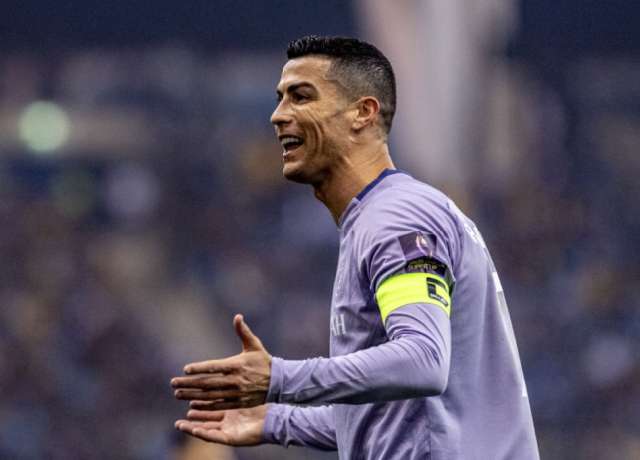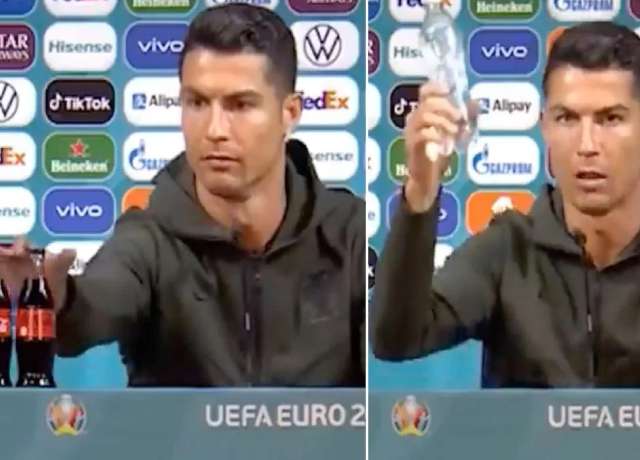This article will tell you about Cristiano Ronaldo’s unreal influence over the world
In June 2021, during the UEFA European Championship, Cristiano Ronaldo, one of the most iconic footballers in the world, inadvertently caused a significant drop in Coca-Cola’s market value.
The incident occurred during a pre-match press conference, where Ronaldo made a gesture that caught the attention of the media and sparked controversy.
In less than 24 hours, the beverage giant lost billions in market value as a result of the incident, revealing the power of high-profile influencers and the importance of brand reputation in today’s digital age.
What Did Cristiano Ronaldo Do In The 2021 UEFA Euro Press Conference?
During a press conference ahead of Portugal’s opening match against Hungary, Cristiano Ronaldo sat down at the table with a bottle of Coca-Cola placed in front of him, as is customary for such events.
However, instead of the usual practice of either taking a sip from the drink or simply pushing the bottle aside, Ronaldo visibly removed the Coca-Cola bottles from the camera frame, seemingly expressing his disapproval of the sugary beverage.
In a surprising move, the football star then reached for a water bottle, held it up, and declared in Portuguese, “Agua!” which means “Water!” in English.
This action, while seemingly innocent and spontaneous, quickly made headlines around the world and went viral on social media platforms.
What Happened To Coca Cola’s Market In 2021?
Ronaldo’s gesture was interpreted by many as a subtle critique of Coca-Cola and its association with unhealthy sugary drinks, which have been linked to various health issues, including obesity and diabetes.
Given Ronaldo’s status as a role model and his strict adherence to a healthy lifestyle, his actions resonated with a broad audience, especially health-conscious individuals and those advocating for better nutrition.
The impact of Ronaldo’s gesture on Coca-Cola’s market value was swift and severe. Reports suggest that within hours of the press conference, the company’s market capitalization dropped by several billion dollars.
This significant dip in value was attributed to a combination of factors, including the high visibility of the UEFA European Championship and the widespread influence of social media, where the incident quickly became a viral sensation.
The situation highlighted the increasing influence of social media platforms in shaping public opinion and affecting businesses’ bottom lines.
In the age of digital communication, actions and statements by prominent figures, especially celebrities and influencers like Cristiano Ronaldo, can quickly gain traction and reach a global audience.
Consequently, brands have become increasingly aware of the potential risks associated with negative associations and the importance of maintaining a positive brand image.
What Did Coca Cola Say About The Incident?
In response to the incident, Coca-Cola issued a statement defending its longstanding association with sports and highlighting its commitment to offering a diverse range of beverage options, including low- and no-sugar alternatives. However, the damage had already been done, and the incident served as a wake-up call for other brands as well.
In the aftermath of the Ronaldo-Coca-Cola incident, brands across various industries began to reevaluate their marketing and sponsorship strategies. Many companies recognized the need to align themselves with influencers who share their values and ethos.
Additionally, they started focusing on promoting healthier products and investing in sustainable and socially responsible practices to maintain a positive brand image.
Cristiano Ronaldo’s actions also initiated discussions about the role of athletes and celebrities as ambassadors for brands and products.
As influencers continue to wield significant power in shaping consumer preferences, the importance of authenticity and ethical considerations in brand endorsements has become a critical aspect of marketing strategies.
Beyond the immediate financial impact, the Ronaldo-Coca-Cola incident underscored the growing awareness and concern about public health and nutrition.
Policymakers, public health advocates, and organizations working to combat obesity and other diet-related health issues found themselves with a powerful moment to leverage in their campaigns for healthier food and beverage choices.












